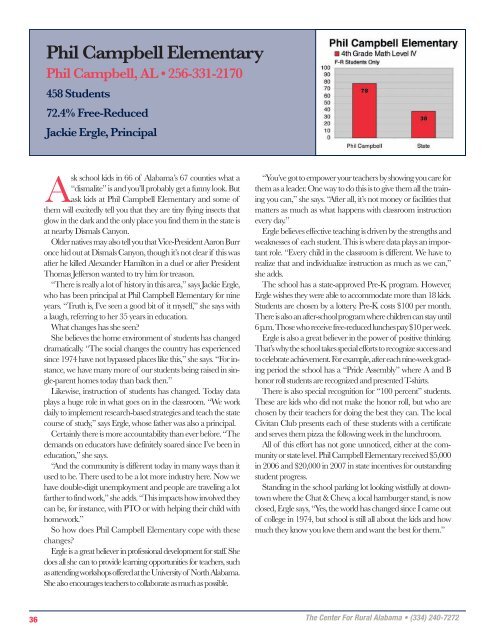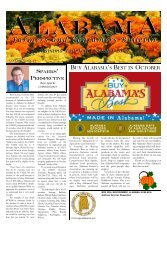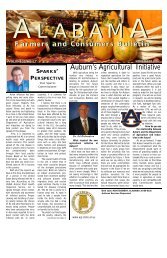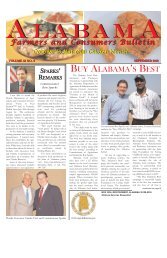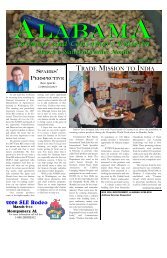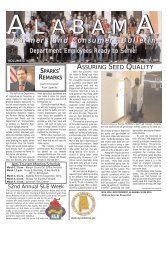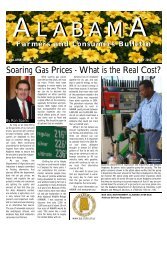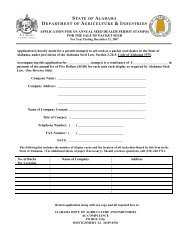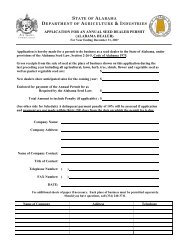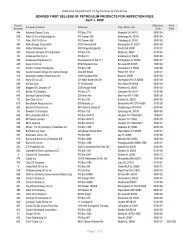Lessons Learned from Rural Schools - Alabama Department of ...
Lessons Learned from Rural Schools - Alabama Department of ...
Lessons Learned from Rural Schools - Alabama Department of ...
You also want an ePaper? Increase the reach of your titles
YUMPU automatically turns print PDFs into web optimized ePapers that Google loves.
LLS-0010 <strong>Lessons</strong> <strong>Learned</strong>_Pub.qrk: 4/25/09 3:02 PM Page 36<br />
36<br />
Phil Campbell Elementary<br />
Phil Campbell, AL • 256-331-2170<br />
458 Students<br />
72.4% Free-Reduced<br />
Jackie Ergle, Principal<br />
Ask school kids in 66 <strong>of</strong> <strong>Alabama</strong>’s 67 counties what a<br />
“dismalite” is and you’ll probably get a funny look. But<br />
ask kids at Phil Campbell Elementary and some <strong>of</strong><br />
them will excitedly tell you that they are tiny flying insects that<br />
glow in the dark and the only place you find them in the state is<br />
at nearby Dismals Canyon.<br />
OldernativesmayalsotellyouthatVice-PresidentAaronBurr<br />
oncehidoutatDismalsCanyon,thoughit’snotclearif thiswas<br />
after he killed Alexander Hamilton in a duel or after President<br />
Thomas Jefferson wanted to try him for treason.<br />
“There is really a lot <strong>of</strong> history in this area,” says Jackie Ergle,<br />
who has been principal at Phil Campbell Elementary for nine<br />
years. “Truth is, I’ve seen a good bit <strong>of</strong> it myself,” she says with<br />
a laugh, referring to her 35 years in education.<br />
What changes has she seen?<br />
She believes the home environment <strong>of</strong> students has changed<br />
dramatically. “The social changes the country has experienced<br />
since 1974 have not bypassed places like this,” she says. “For instance,<br />
we have many more <strong>of</strong> our students being raised in single-parent<br />
homes today than back then.”<br />
Likewise, instruction <strong>of</strong> students has changed. Today data<br />
plays a huge role in what goes on in the classroom. “We work<br />
daily to implement research-based strategies and teach the state<br />
course <strong>of</strong> study,” says Ergle, whose father was also a principal.<br />
Certainlythereismoreaccountabilitythaneverbefore.“The<br />
demands on educators have definitely soared since I’ve been in<br />
education,” she says.<br />
“And the community is different today in many ways than it<br />
used to be. There used to be a lot more industry here. Now we<br />
have double-digit unemployment and people are traveling a lot<br />
farthert<strong>of</strong>indwork,”sheadds.“Thisimpactshowinvolvedthey<br />
can be, for instance, with PTO or with helping their child with<br />
homework.”<br />
So how does Phil Campbell Elementary cope with these<br />
changes?<br />
Ergle is a great believer in pr<strong>of</strong>essional development for staff. She<br />
does all she can to provide learning opportunities for teachers, such<br />
asattendingworkshops<strong>of</strong>feredattheUniversity<strong>of</strong> North<strong>Alabama</strong>.<br />
Shealsoencouragesteacherstocollaborateasmuchaspossible.<br />
“You’vegottoempoweryourteachersbyshowingyoucarefor<br />
themasaleader.Onewaytodothisistogivethemallthetraining<br />
you can,” she says. “After all, it’s not money or facilities that<br />
matters as much as what happens with classroom instruction<br />
every day.”<br />
Ergle believes effective teaching is driven by the strengths and<br />
weaknesses <strong>of</strong> each student. This is where data plays an important<br />
role. “Every child in the classroom is different. We have to<br />
realize that and individualize instruction as much as we can,”<br />
she adds.<br />
The school has a state-approved Pre-K program. However,<br />
Ergle wishes they were able to accommodate more than 18 kids.<br />
Students are chosen by a lottery. Pre-K costs $100 per month.<br />
Thereisalsoanafter-schoolprogramwherechildrencanstayuntil<br />
6p.m.Thosewhoreceivefree-reducedlunchespay$10perweek.<br />
Ergle is also a great believer in the power <strong>of</strong> positive thinking.<br />
That’swhytheschooltakesspecialeffortstorecognizesuccessand<br />
tocelebrateachievement.Forexample,aftereachnine-weekgrading<br />
period the school has a “Pride Assembly” where A and B<br />
honor roll students are recognized and presented T-shirts.<br />
There is also special recognition for “100 percent” students.<br />
These are kids who did not make the honor roll, but who are<br />
chosen by their teachers for doing the best they can. The local<br />
Civitan Club presents each <strong>of</strong> these students with a certificate<br />
and serves them pizza the following week in the lunchroom.<br />
All <strong>of</strong> this effort has not gone unnoticed, either at the communityorstatelevel.PhilCampbellElementaryreceived$5,000<br />
in 2006 and $20,000 in 2007 in state incentives for outstanding<br />
student progress.<br />
Standing in the school parking lot looking wistfully at downtown<br />
where the Chat & Chew, a local hamburger stand, is now<br />
closed, Ergle says, “Yes, the world has changed since I came out<br />
<strong>of</strong> college in 1974, but school is still all about the kids and how<br />
much they know you love them and want the best for them.”<br />
The Center For <strong>Rural</strong> <strong>Alabama</strong> • (334) 240-7272


